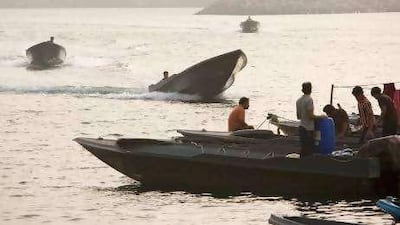KHASAB, OMAN // Once a week, Abu Ali, an Omani businessman, stands on the wooden platform at Khasab Port and watches as goats scamper into the back of his lorry from an Iranian-registered boat. After slamming shut the tailgate, he hands over a wad of money to the boat's skipper and hops into the passenger seat. The destination is his farm, a 20-minute drive to the hills of the Musandam Peninsula.
Notably absent from the exchange are customs officials and passenger manifests - the sort of things that connote legality. But here in this town on the peninsula, which is cut off from the rest of Oman, the black market thrives. Cigarettes, petrol and other goods flow back and forth from the Islamic Republic. Some of the transactions are in breach of international sanctions against Iran. Others violate local laws.
Khasab's "open gate" policy is leading to an influx of illegal drugs, such as heroin and marijuana, into the Arabian Peninsula, much of it thought to be arriving from South Asia and Iran. Omani officials, speaking on condition of anonymity because they were not authorised to discuss the issue, acknowledged the problem. But they fear that curbing the flow of drugs could hurt a local economy in which jobs are few.
The black market sustains this impoverished peninsula perched at the entrance to the Gulf, where the few other employment options include limited government work and fishing. According to Mr Ali, if the authorities are not turning a blind eye to illicit trade, they certainly are profiting from it. "The government in Muscat must pay more attention to the problem here because there is something fundamentally wrong with the local authorities in Musandam," he said.
"Packets of drugs are stuffed in the backsides of the animals to avoid custom police detection. But police should be inspecting these goats instead of just passing them through without inspection." Even if scrutiny is lax, a retired policeman in the area who asked to be referred to only as Hamdoon said smugglers employ techniques to try to disguise their activities. "People in speedboats, disguised as fishermen, would meet the goat boats halfway from the port to get the drugs," said Hamdoon. "They are hired by drug dealers who are waiting at the beach in their cars to collect the narcotics."
Part of the problem is that monitoring the port and the vessels that arrive from the adjacent waterway, the Strait of Hormuz, can be daunting. It is one of the most strategically vital waterways in the world, with roughly 20 per cent of the world's crude oil exports passing through the corridor. On clear days, locals say, the contours of the Iranian coastline can be identified on the horizon. Ranging from minuscule fishing boats to bulky supertankers, roughly 900 vessels plough through the strait on any given day.
A spokesman for the Oman Coast Guard, who spoke on condition of anonymity, described patrolling the waterway for illegal drugs as something equivalent to searching for needles in a haystack. "It is impossible to stop and search every vessel in the strait. The majority of the smaller vessels come from Iran to arrive in Khasab after sunset and leave before just sunrise. We catch some drug dealers, mostly on tip-off from local people, some escape the net."
He said that only about 20 drug dealers a year, primarily from South Asian countries, are arrested by Omani authorities. "Several hundred" of them reside in Oman at any given time, said the spokesman. "Not all of them live in the country; most commute illegally by boat through the Strait of Hormuz to other neighbouring countries." Facing an uphill battle to stem the flow of narcotics into the country, the Omani police this year began offering rewards for tips leading to traffickers, which led to the arrest of drug offenders, according to local newspaper reports.
"The police now use fishermen and people who live near the beaches to spy on the late-night activities of speedboats when they come over," said one fisherman in Khasab, who identified himself as Abu Kana'ad and who said he tipped off the police. "They are successful in some respects, but it is too early to say how successful this new scheme of tips-for-rewards will be." Ranging from heroin and opium to hashish, much of the contraband is destined for Muscat, the Omani capital, as well as smaller cities such as Sohar and Salalah.
Abu Kana'ad, however, said the majority of it was headed elsewhere. Because of US-backed sanctions imposed on Iran, smugglers also use the Strait of Hormuz to import luxury goods from the UAE through Khasab Port. The returning boats are laden with livestock, such as the goats purchased by Mr Ali. "Musandam is used as a transit point to a much bigger market," said Abu Kana'ad, adding his suspicions: "I also suspect they bribe boarder officials as well."
salshaibany@thenational.ae

